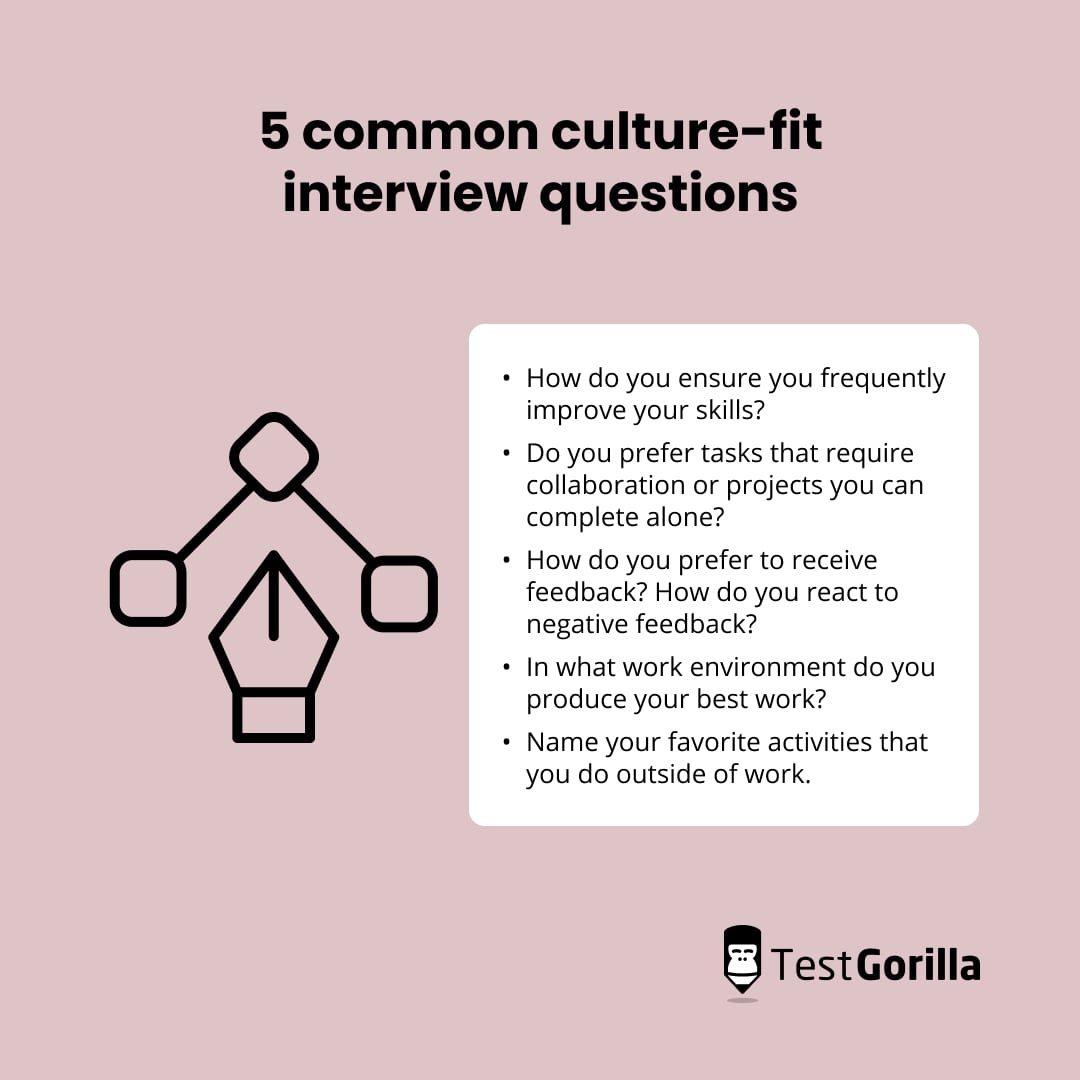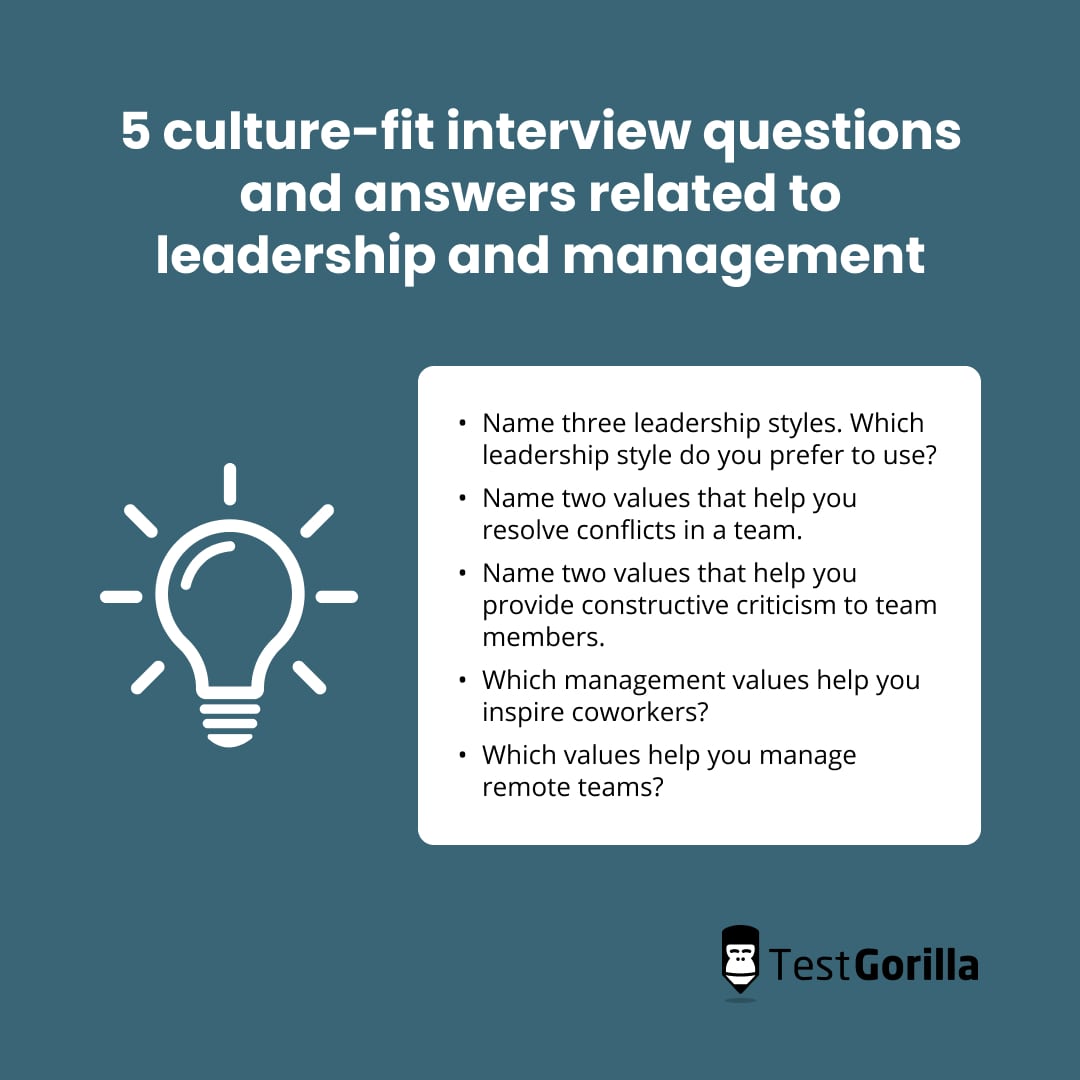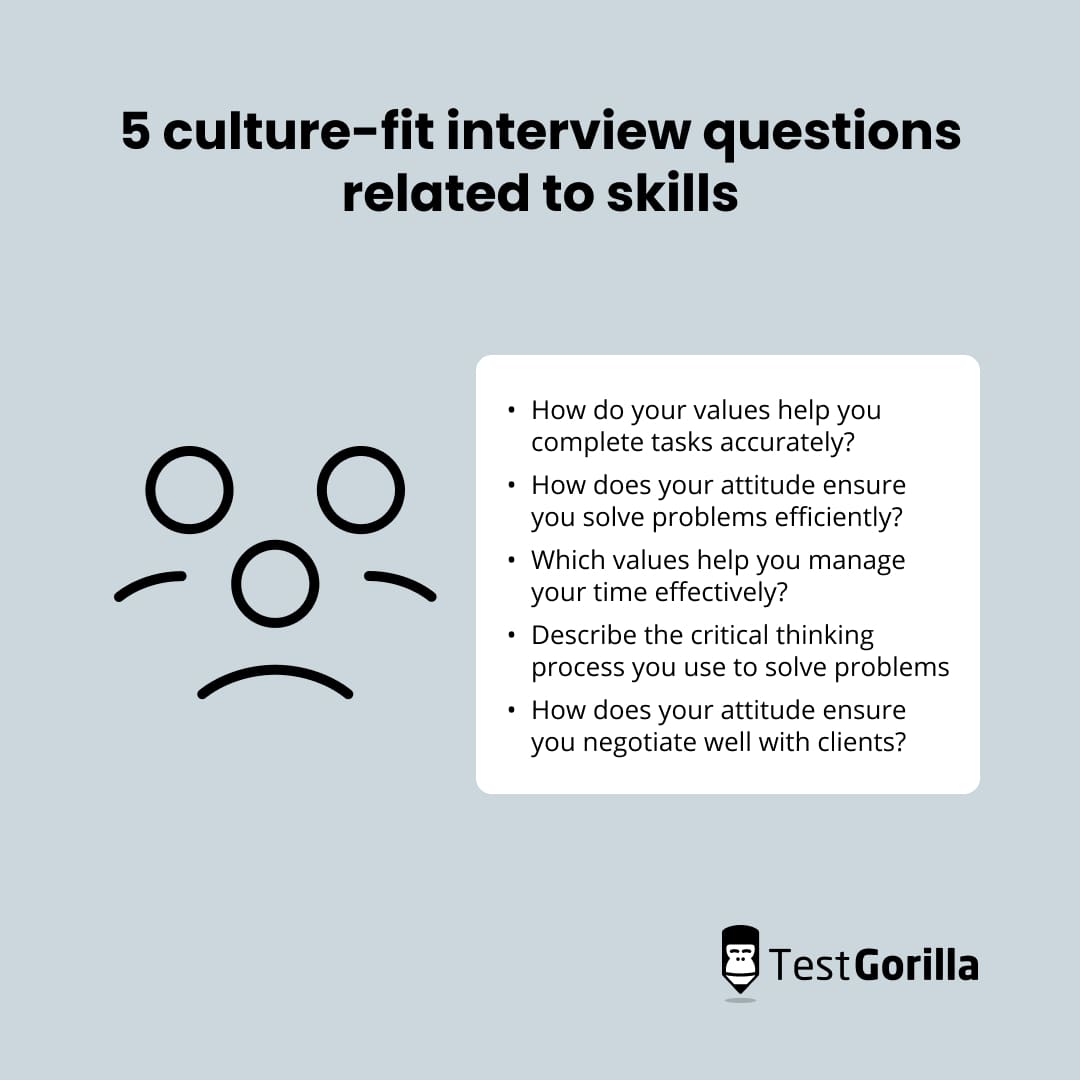50 culture-fit interview questions for learning more about applicants’ values
Hiring a candidate who is a good fit for the culture of your organization can be tricky, but it is an important part of the hiring process.
Using Personality & Culture tests is a data-driven approach for identifying talent with values that match your organization. However, you may need an extra method to assess your applicants’ culture fit.
That’s why meeting with applicants is important, and interviewing is a great way to achieve this.
With a comprehensive list of culture-fit interview questions and an effective interview process, you can:
Find out more about your candidates’ values and personalities
Decide whether your applicants are eager to learn new skills
Discover more about the values that drive your candidates’ learning styles
Check whether your interviewees’ values match your organization’s
You need to prepare a list of appropriate questions to find the perfect candidate – but this can be tough. To make your job easier, we’ve put together a list of 50 culture-fit interview questions to learn about your applicants’ values.
Table of contents
- 5 common culture-fit interview questions and answers
- 14 culture-fit interview questions to ask leaders and managers
- 5 culture-fit interview questions and answers related to leadership and management
- 5 culture-fit interview questions and answers related to skills
- When should you use culture-fit interview questions?
- What is the difference between culture fit and culture add (and which is better)?
- Evaluate your applicants using culture-fit interview questions
5 common culture-fit interview questions and answers
Here are five common culture-fit interview questions and answers for assessing responses and checking whether your candidates’ values align with your organization.
1. How do you ensure you frequently improve your skills?
Candidates who frequently improve their skills are likely to be assets to your team as they focus on enhancing workplace performance. 58% of the workforce will require new skills to complete their duties properly, another reason to check whether your candidates are dedicated to learning new skills.
Applicants may ensure they frequently improve their skills by:
Setting themselves new goals
Finding skilled mentors
Completing education courses
Seeking feedback related to areas of improvement
2. Do you prefer tasks that require collaboration or projects you can complete alone?
Asking whether applicants prefer collaborating or working alone may give you an idea about their values. It’s okay if candidates prefer one working style over the other, but you should consider whether your applicants can embrace your company’s values and understand how they relate to work preferences.
For example, candidates should understand the values of teamwork, such as open communication and willingness to adapt – especially if these are core values in your organization.
3. How do you prefer to receive feedback? How do you react to negative feedback?
Since feedback can help employees improve the quality of their work, they should consider how to accept constructive criticism. If your candidates react negatively to constructive feedback, they may not understand the importance of frequent improvement, and this can hinder their development.
Some candidates may prefer to receive written feedback to check which actions they need to improve for future projects. Other candidates may prefer to receive feedback in a meeting so they can ask questions about different aspects of constructive criticism.
Consider whether your candidates use feedback in their work and recognize why improvement is a key value in your organization – the key is ensuring that they can accept criticism and that they see the value of it.
4. In what work environment do you produce your best work?
If your applicant prefers to work in an environment that you don’t provide and cannot learn to adapt to your organization, they probably won’t be a good fit for your company.
For example, if you offer a hybrid arrangement in which your employees work in the office and from home, applicants who prefer to only work remotely may be unsuitable for your vacancy.
Ensure your applicants can accept and thrive in the work environment you provide to enhance the team’s productivity.
5. Name your favorite activities that you do outside of work.
Asking this culture-fit interview question may help you learn about your candidates’ values outside of work and determine if they correlate with your organization’s culture.
For instance, if your organization’s values include curiosity and constant improvement, consider whether your applicants practice their skills outside of the work environment in side projects – ask for specific examples and scenarios.
14 culture-fit interview questions to ask leaders and managers
This list of culture-fit interview questions is perfect for interviewing leaders and managers about skills, values, and strategies. Ask them some of these questions to learn about their management experience.
Which adjectives would your coworkers use to describe your leadership values?
Which management values help you inspire coworkers?
Are there any leadership values you would endorse in our organization?
Name two values that help you provide constructive criticism to team members.
Name two values that help you resolve conflicts in a team.
Which values help you manage remote teams?
How would you reward team members who are consistently performing well?
Which values help you maintain successful business relationships with clients?
Name three leadership styles. Which style do you prefer to use?
Which skills are most important for leaders?
Describe your business-acumen skills.
Which techniques help you manage projects?
Describe how you delegate tasks to team members.
How often do you meet with team members to discuss projects or offer feedback?
The best insights on HR and recruitment, delivered to your inbox.
Biweekly updates. No spam. Unsubscribe any time.
5 culture-fit interview questions and answers related to leadership and management
Here, we’ve selected the most important culture-fit interview questions and provided sample answers. Check your applicants’ responses by using the sample answers as a guide.
1. Name three leadership styles. Which leadership style do you prefer to use?
In addition to the democratic leadership style, your candidates may mention two other examples: autocratic and transformational leadership. While democratic leadership is among the most effective because it encourages team members to participate, other styles can be effective depending on your organization’s values.
For instance, if your startup business values inquisitive attitudes, you may consider applicants with a delegative leadership style, as you know that they will fit your team.
2. Name two values that help you resolve conflicts in a team.
Resolving conflicts in a team requires several skills and values, including active listening, transparency, honesty, and negotiation. When assessing your candidates’ values and conflict resolution approaches, consider whether their values align with your organization’s culture.
If your organization’s values include openness during team conflicts, ensure your potential leader understands why openness is important for handling these situations.
3. Name two values that help you provide constructive criticism to team members.
Providing constructive criticism to team members is essential when encouraging them to enhance their productivity. Honesty and being supportive are crucial for any leader offering constructive feedback, so consider whether your applicants understand why these values are important and how they will put them into practice.
Suitable candidates should understand that being honest and supportive can increase their team’s morale and encourage them to fulfill their potential in the workplace.
4. Which management values help you inspire coworkers?
According to statistics, 51% of workers are not engaged in their work – this is an issue because engagement is important for productivity. As a result, finding a leader who can inspire their coworkers with their values is important.
Applicants may explain that passion, continuous learning, constant improvement, and innovation are key values that help them inspire and motivate their employees. If you need to determine whether your potential managers have the right management values for your organization, our Leadership & People Management test will help you assess them.
5. Which values help you manage remote teams?
Managing remote teams requires various skills and attitudes, such as effective communication, transparency, flexibility, and respect for a good work/life balance. Your candidates must know how these values can enhance their team’s output.
Applicants may pick one value, such as flexibility, and explain how it helps them manage remote teams. For instance, respecting their team’s work/life balance may help your candidates promote a flexible environment, arrange meetings that align with their team’s schedule, and manage their team (even if they use asynchronous communication methods).
5 culture-fit interview questions and answers related to skills
Check the list in this section to find culture-fit interview questions and answers related to skills and learn about your candidates’ core workplace abilities.
1. How do your values help you complete tasks accurately?
As your candidates answer this culture-fit interview question, listen out for experiences that demonstrate attention to detail. For instance, interviewees may mention that they are meticulous and talk about values that uphold their attention to detail, such as:
Accountability
Continuous improvement
Consistent quality
It’s easy to assess whether your candidates are detail-oriented with our popular Attention to Detail (Textual) test, available on our free plan. This test helps you to evaluate whether candidates can check data consistency, filter information, and use analytical skills to handle intricate processes.
2. How does your attitude ensure you solve problems efficiently?
The best answers to this culture-fit interview question will describe instances when your applicant’s attitude helped them solve problems. Candidates may explain that their curiosity and innovative values made finding methods to handle the problem easier.
One of the easiest ways to check whether your applicants enhance their problem-solving success rate is to use our Problem Solving test. With this test, you can assess your candidate’s ability to:
Analyze information and data to evaluate complex situations
Use logic to decide which methods will help solve the problem
Decide which order to implement the methods after considering the information
Arrange schedules to solve the problem efficiently
3. Which values help you manage your time effectively?
Many values may help candidates to manage their time efficiently, such as conscientiousness toward customer satisfaction and commitment to accountability. By providing a few examples of how their values have enhanced their time management, candidates can show they are committed to completing projects punctually.
For example, your applicant’s conscientiousness and commitment to client satisfaction may motivate them to produce high-quality products before the deadline.
Your best option for checking your candidates’ time management is to compare their interview responses with their Time Management skill test results. The test assesses your candidates’ abilities to plan, prioritize, execute, and receive project feedback. Check out this test on our website for more information.
4. Describe the critical thinking process you use to solve problems
Nearly every employer who responded to a NACE study indicated that critical thinking is extremely important for college graduates, but just 55.8% thought their recent graduates were effective critical thinkers. Since employers widely agree that critical thinking is a vital skill, review your applicants’ critical faculties by asking this culture-fit interview question.
Applicants should explain the steps in their critical thinking process. They might mention why it is important to:
Ask questions about the problem
Interpret the information they receive
Evaluate the data
Think of innovative methods
Decide which innovative methods they should implement
Learn more about your applicants’ critical-thinking skills with our Critical Thinking test.
5. How does your attitude ensure you negotiate well with clients?
Asking this question will help you to determine whether your candidates are prepared for negotiation responsibilities and have the right attitude to take them on.
Negotiation skills and motivation can ensure that team members can negotiate well with clients – consider whether candidates have the right experience and attitude by asking additional questions such as, “How did your attitude help you achieve good results when negotiating with clients?”
To assess your applicants’ negotiation skills, you may consider using our Negotiation skill test, available in our test library.
When should you use culture-fit interview questions?
Although you may be eager to meet candidates and learn about their values, the path to success is to use culture-fit interview questions after applicants have completed a skills assessment. This means that you can narrow down your applicants and avoid spending time interviewing unsuitable candidates.
With a culture-fit assessment, you also eliminate the need to screen resumes. And they enable you to focus on the data when evaluating your candidates, helping you find the strongest individual in no time.
What is the difference between culture fit and culture add (and which is better)?
Culture fit and culture add may seem like similar terms, but one factor sets them apart. While culture fit involves looking for candidates whose values match your organization and team’s work values, culture add involves hiring candidates with unique values lacking in your current organization.
To ensure your organization receives innovative ideas, new perspectives, and unique personalities to progress, you may need to hire for culture add. It’s ideal for hiring for growth, productivity, and gaining unique insights into customer satisfaction, which is crucial for helping your business to expand.
Evaluate your applicants using culture-fit interview questions
Since assessing your applicants’ values and how they match your organization is ideal for predicting team dynamics after you hire a candidate, it’s important to ask candidates the right culture-fit interview questions to learn more about them.
Just choose from the 50 culture-fit interview questions in this article and make a culture-fit assessment that works for your hiring process.
TestGorilla has the Personality & Culture tests you need to assess culture fit. For more information on skills testing, see how TestGorilla works by registering for a demonstration.
You've scrolled this far
Why not try TestGorilla for free, and see what happens when you put skills first.





















